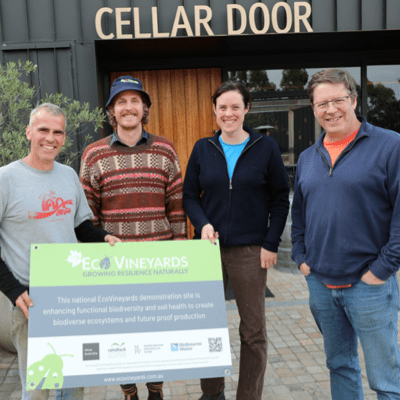Tell us in a few sentences about your experience as a viticulturist, how did you arrive here?
Ten Minutes by Tractor was established in 1997 and has grown over the years to multiple sites across the Peninsula with a diversity in planting densities and microclimates. Our vineyard manager, Fabiano Frangi works closely with head winemaker Imogen Dillon to grow and produce vines and wines with distinction and balance.
With over 20 years’ experience between them, across various wine regions throughout Australia and the world, they both have a huge passion and drive towards making a premium product while supporting, engaging and increasing the functionality and sustainability of the eco system amongst their vines and the land on the Mornington Peninsula.
Why did you decide to apply to be an EcoGrower, was there something specific that influenced your decision and/or had you attended a previous EcoVineyards session?
Ten Minutes by Tractor has always considered and valued the way in which we manage our vineyards across the region. EcoVineyards stood out to us as a fantastic platform to engage even further, given the knowledge associated with the program, and the experimental aspect to be involved with more diverse and ecofriendly projects.
Has there been a defining moment or catalyst for you to move towards more ecologically driven viticultural practices?
Our whole team is incredibly supportive of each other to drive a more ecological based viticulture management program. While we have consistently touched on various areas focusing on a more sustain and eco-friendly management plan, we feel that at the moment our team is the strongest it has been from a knowledge, passion and continuity that has given us confidence to reach further heights across our vineyards.
Can you provide a brief overview of your project ideas, and what you wish to achieve over the 3 years and why is this important to you?
We have decided to focus on driving and increasing our beneficial insect population and using this tool to combat pests such as LBAM and snails within in the vineyard. Biodiversity strips will assist us to increase the population and new technology and methods across the 3 years will also create measures to reduce pests and damage to the vines and grapes within the vineyard.
It is important to us to increase the health of our vines, improve the quality of our grapes and therefore wines using ecological methods such as these listed.
Are you just starting to learn, or have you been enhancing biodiversity on your property and is this an extension of what you are currently doing? If so, please tell us more.
Joining EcoVineyards will be an extension of what we have been doing across our sites. While we have been actively partaking in composting, undervine management and cover crops we are yet to completely focus on improving our biodiversity and beneficials.
Tell us about your hidden superpowers, something that others don’t know about you or a practice you would like to champion?
Our superpower is our incredibly passionate and devoted winemaking and viticulture team focused on achieving incredible results.
Where do you see grape growing in the future, do you feel there is an urgency to change current practices? If so, why?
There is always room to continue to develop, explore and improve systems and practices across our wine regions. The future is to become more in tune with the eco systems we have and use nature to achieve the desired outcomes for long term sustainable and reliable agriculture.
What else would you like to share with the broader EcoVineyards community, what gets you excited about the future?
More programs such as EcoVineyards that create a forum for more businesses to engage in ecological viticultural techniques and systems. The focus on the way we manage the land in a sustainable way is incredibly important along with the understanding of different techniques used in the various regions and microclimates helping develop and bring about a brighter future for the wine industry.

